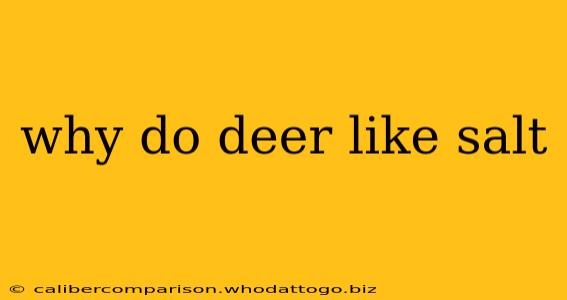Deer, like all mammals, require sodium (salt) for various crucial bodily functions. Understanding why they crave salt reveals fascinating insights into their biology and survival strategies. This isn't just a quirky habit; it's a vital aspect of their health and well-being.
The Crucial Role of Sodium in Deer Physiology
Sodium plays a multifaceted role in deer physiology:
-
Fluid Balance: Sodium is essential for maintaining proper fluid balance within the body. It helps regulate the movement of water between cells and tissues, preventing dehydration and ensuring efficient bodily functions. This is particularly critical in hot climates or during periods of physical exertion.
-
Nerve and Muscle Function: Sodium is vital for the transmission of nerve impulses and the proper contraction of muscles. Without sufficient sodium, these processes become impaired, leading to weakness, fatigue, and potential health problems.
-
Digestion and Nutrient Absorption: While less directly involved than in other processes, sodium assists in digestion and nutrient absorption in the gut. Optimal sodium levels contribute to efficient nutrient uptake from food.
-
Overall Health and Vitality: Adequate sodium intake contributes significantly to a deer's overall health, boosting their immune system and overall vitality. A deficiency can lead to weakness, reduced reproductive success, and increased vulnerability to disease.
Why Deer Seek Salt Licks and Other Sources
Deer obtain sodium from various sources, but natural sources are often scarce, especially in certain environments. This scarcity is why they actively seek out salt licks, which are artificial sources providing concentrated sodium.
-
Natural Diet Deficiencies: A deer's natural diet, primarily plants, often lacks sufficient sodium. Different plants contain varying amounts of sodium, and some regions may have vegetation inherently low in this crucial mineral.
-
Salt Lick Behavior: This is where the observed behavior of deer visiting salt licks comes into play. Salt licks provide a concentrated and readily available source of sodium, supplementing the deficiencies in their natural diet.
-
Sweat and Urine Excretion: Deer lose sodium through sweat and urine, requiring regular replenishment to maintain healthy levels. Increased activity, especially during hot weather, accelerates sodium loss, further emphasizing the need for salt supplementation.
The Implications for Deer Management and Conservation
Understanding deer's need for salt has implications for wildlife management and conservation efforts:
-
Supplementation Strategies: Providing supplemental salt licks in areas with known sodium deficiencies can significantly improve deer health and populations. However, responsible placement and management of these licks are crucial to prevent environmental damage or the spread of disease.
-
Habitat Management: Understanding the sodium content of vegetation in different habitats informs effective land management practices. Promoting the growth of plants richer in sodium can naturally address dietary deficiencies.
-
Research and Monitoring: Continued research into deer nutrition and sodium requirements allows for improved management strategies and conservation efforts. Monitoring deer health in relation to salt availability provides valuable insights into population dynamics and overall ecosystem health.
In conclusion, deer's craving for salt isn't simply a peculiar behavior; it's a fundamental requirement for survival, reflecting the crucial role of sodium in maintaining their health and vitality. Understanding this need is key to effective deer management and conservation.

